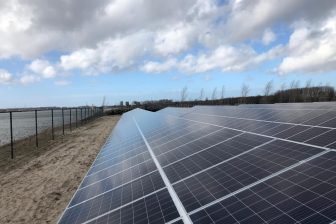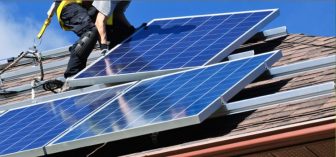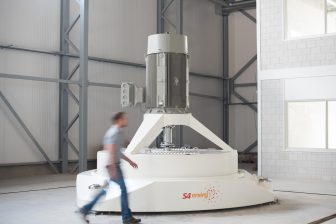‘Renewable Energy Will Not Support Economic Growth’
7 juni 2015 – Wat betekent overstappen op zonne- en windenergie voor onze economie? Richard Heinberg (Post Carbon Institute) voorspelt vergaande gevolgen.
Heinberg schrijft dat in een opiniebijdrage op Resilience.org (een ‘veerkrachtige’ lees- en ontmoetingsplek rond noodzakelijke veranderingen in de samenleving).
‘The world needs to end its dependence on fossil fuels as quickly as possible. That’s the only sane response to climate change, and to the economic dilemma of declining oil, coal, and gas resource quality and increasing extraction costs. The nuclear industry is on life support in most countries, so the future appears to lie mostly with solar and wind power. But can we transition to these renewable energy sources and continue using energy the way we do today? And can we maintain our growth-based consumer economy? The answer to both questions is, probably not.’
Heinberg loopt in zijn bijdrage vier sectoren na waar hij problemen ziet ontstaan:
- De energievoorziening zelf
Alle groei van electriciteit uit zon en wind ten spijt: ‘only about one-fifth of all final energy is consumed in the form of electricity; how about other forms and ways in which we use energy—will they be easier or harder to transition?’ - De transportsector
Elektrische auto’s worden steeds gewoner, al wordt het overschakelen van vrachtvervoer nog een hele klus. Maar ‘the construction of all of our vehicles, and the infrastructure they rely upon (including roads and runways), also depends upon industrial processes that currently require fossil fuels.’ - De industrie
‘Current manufacturing processes for building solar panels and wind turbines also depend upon high-temperature industrial processes fueled by oil, coal, and natural gas. Again, alternative ways of producing this heat are feasible in principle—but the result would probably be significantly higher-cost solar and wind power.’ - De voedselvoorziening
‘Food products—and the chemical inputs to farming—are currently transported long distances using oil, and farm machinery runs on refined petroleum. It would be possible to grow food without chemical inputs and to re-localize food systems, but this would probably require more farm labor and might result in higher-priced food.’
‘There are far more challenges associated with the energy transition than opportunities. There are potential solutions to all of the problems we have identified. But most of those solutions involve higher costs or reduced system functionality. Moreover, the energy dynamics of the transition itself will pose a challenge: where will the energy come from to build all the solar panels, wind turbines, batteries, electric blast furnaces, and solar cement kilns that we’ll need?’
Deze problemen en de noodzaak van een drastische herziening van ons gebruik van energie vergen volgens Heinberg een totaal andere economie. ‘That implies a nearly complete rethinking of the economy—both its means and its ends. Growth must no longer be the economy’s goal; rather, we must aim for the satisfaction of basic human needs within a shrinking budget of energy and materials. Meanwhile, to ensure the ongoing buy-in of the public in this vast collaborative project, our economic means must include the promotion of activities that increase human happiness and well being.’
Heinberg vraagt reacties. (En wie reageert zou ook een kopietje naar de redactie van FluxEnergie kunnen sturen)
Bronnen
Resilience, 7 juni 2015: Renewable Energy Will Not Support Economic Growth



